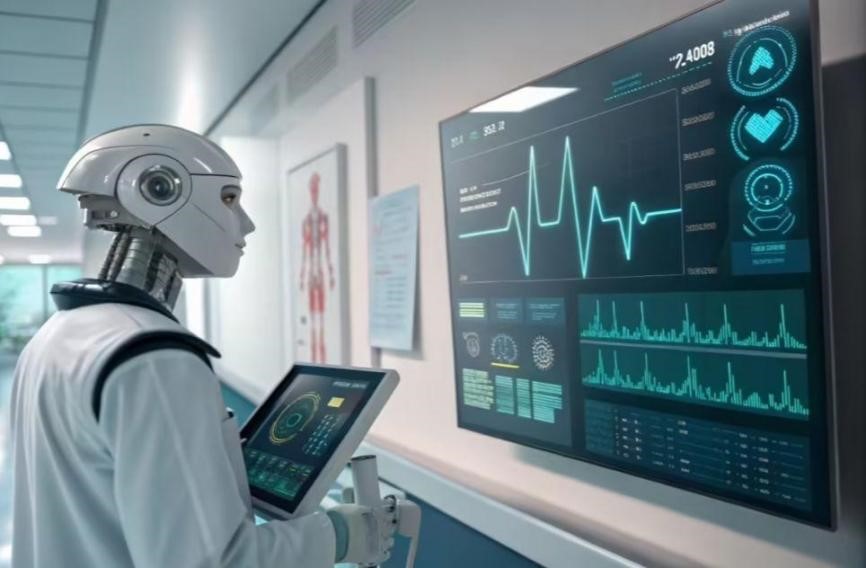In the healthcare sector, the application of artificial intelligence (AI) is expanding at an unprecedented rate, and its potential is constantly being tapped and applied to various scenarios. The UK's National Health Service (NHS) is about to trial an AI tool called "Aire", an innovative technology that can predict a patient's risk of illness and early death, especially in the risk assessment of heart disease, marking another milestone in the healthcare sector.
1. The core advantages and working principles of Aire technology
Aire technology, which stands for AI-ECG risk estimation, is unique in that it can detect potential structural cardiac abnormalities that doctors may have overlooked through deep learning of electrocardiogram (ECG) test results. As a routine cardiac examination, ECG can record the electrical activity of the heart, but the traditional interpretation method is limited by the experience and knowledge of doctors, and it is sometimes difficult to capture subtle abnormal signals. Aire technology uses machine learning algorithms to train and analyze large amounts of ECG data to identify heart problems that doctors may overlook, providing strong support for early detection of heart disease risk.
The training of Aire's technology is based on a dataset of 1.16 million ECG test results from 189,539 patients, and the richness and diversity of these data allows Aire to learn the characteristics of various heart diseases, thereby improving the accuracy of its predictions. Through continuous learning and optimization, Aire technology has been able to demonstrate significant advantages in a variety of cardiac risk assessment scenarios.

Figure: AI technology in UK hospitals can predict heart disease risk 10 years in advance, with an accuracy rate of 78%
2. Accuracy and clinical application of Aire technology
A study published in The Lancet Digital Health found that Aire technology has remarkable accuracy in predicting heart disease risk. In 78% of cases, Aire was able to correctly identify the patient's risk of dying within 10 years of the ECG. In addition, Aire was 76% accurate in predicting future serious heart rhythm problems and 70% accurate in predicting future atherosclerotic cardiovascular disease. These data demonstrate that Aire technology has a high degree of accuracy and utility in predicting heart disease risk, and can provide strong support for clinical decision-making.
The clinical application of Aire technology is promising. It can not only be used as an auxiliary tool to help doctors more accurately assess the risk of heart disease in patients, but also provide personalized treatment plans and health management recommendations for heart patients. By identifying potential heart problems in advance, Aire technology helps to reduce the incidence and mortality of heart disease and improve the quality of life of patients.
3. Clinical application and promotion plan of Aire technology
Aire technology is expected to be first trialled at two NHS Trust hospitals in London in the middle of next year. Hundreds of patients will be recruited initially to validate the accuracy and reliability of the Aire technology through real-world applications. As the trial progresses, Aire technology will be scaled up for more in-depth research and validation. Experts hope that within the next five years, the Aire technology will be rolled out to the entire healthcare system, which will greatly improve the early identification and management of heart disease risk, bringing benefits to more patients.
4. the goal and future prospect of Aire technology
Arunahis Sau, a registered cardiologist at Imperial College NHS Trust Hospital, who participated in the trial, said the goal of the project was not to replace doctors, but to achieve "beyond humans" through AI technology. The application of Aire technology is promising, not only in healthcare settings, but also in providing personalized cardiovascular disease risk prediction in home monitoring and medical scenarios. With the continuous advancement of technology and the deepening of applications, Aire technology is expected to become an important tool for the prevention and treatment of cardiovascular diseases worldwide.
5. Conclusion
The introduction of Aire technology marks an important breakthrough in the field of cardiac risk assessment with AI technology. By improving the accuracy of heart disease risk assessment, Aire technology is able to provide clinicians with deeper insights to help them better manage patients and reduce the risk of disease development. With the continuous advancement of technology and the increase in market demand, Aire technology is expected to continue to play an important role in the future medical market, providing strong support for the prevention and treatment of cardiovascular diseases worldwide. At the same time, the successful application of Aire technology will also provide useful reference and inspiration for the application of AI technology in other medical fields.






